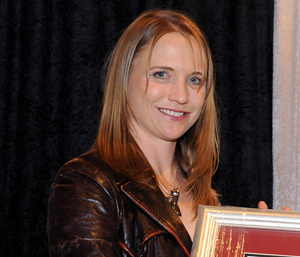
Pauline Gutter |
Her work can be described as a visual attack of marks and colour, and the purposeful application of layering and interweaving of layers that gives the identity of continuous flux and ideological migration. Her work highlights the ‘removal’ of the farming community from their land. A review of a recent exhibition described her themes as: “A struggle for survival prevails in the dangerous world that is projected to us in the paintings …”
Gutter is not just a top professional artist, but also a well-known brand. True to her roots, her work often mirrors a passion for the farming community. In 2013, she won the ABSA L’Atelier prize of R125 000, as well as a half year’s stay in the Cité Internationale des Arts in Paris, France.
This art competition is South Africa’s most prestigious art competition and is held annually for artists between ages 21 and 35. This award not only ensures South Africa’s emerging artists of recognition, but also affords them the opportunity to develop their talents abroad.
The UFS is very proud of breeding this class of artist. According to Gutter, her lecturers allowed them space to work on their own identities. Her work has now moved far from simply being portraits and sculptures, it also makes an impact on those who see it.
As a student, Gutter was involved in many community projects at her residence. In 2003 she was one of the two managers of the Dithwele waste sculpture park competition, an initiative of SAB. She is a diverse artist who has worked on KYKNET productions as co-worker and assistant. Gutter also does freelance camera work.
Furthermore, Gutter was on the Mail & Guardian’s list of top 200 young South Africans, an annual list that has become the premier collection of the leaders of tomorrow – and in many cases, today. She also received the Helgaard Steyn prize and was a finalist in the Sasol New Signatures Art Competition.